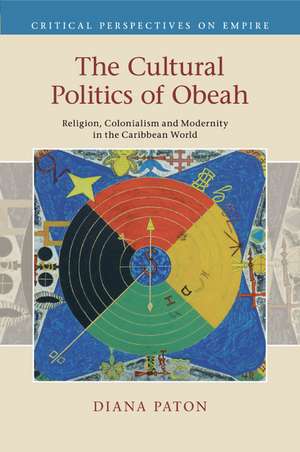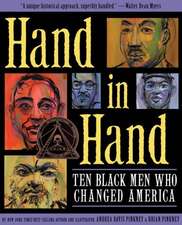The Cultural Politics of Obeah: Religion, Colonialism and Modernity in the Caribbean World: Critical Perspectives on Empire
Autor Diana Patonen Limba Engleză Paperback – 12 iul 2017
| Toate formatele și edițiile | Preț | Express |
|---|---|---|
| Paperback (1) | 321.31 lei 6-8 săpt. | |
| Cambridge University Press – 12 iul 2017 | 321.31 lei 6-8 săpt. | |
| Hardback (1) | 755.87 lei 6-8 săpt. | |
| Cambridge University Press – 9 aug 2015 | 755.87 lei 6-8 săpt. |
Din seria Critical Perspectives on Empire
- 9%
 Preț: 662.84 lei
Preț: 662.84 lei -
 Preț: 291.69 lei
Preț: 291.69 lei -
 Preț: 299.41 lei
Preț: 299.41 lei -
 Preț: 159.35 lei
Preț: 159.35 lei -
 Preț: 230.34 lei
Preț: 230.34 lei - 5%
 Preț: 219.29 lei
Preț: 219.29 lei -
 Preț: 232.91 lei
Preț: 232.91 lei - 9%
 Preț: 629.31 lei
Preț: 629.31 lei -
 Preț: 279.30 lei
Preț: 279.30 lei -
 Preț: 259.43 lei
Preț: 259.43 lei -
 Preț: 235.13 lei
Preț: 235.13 lei -
 Preț: 227.65 lei
Preț: 227.65 lei -
 Preț: 239.11 lei
Preț: 239.11 lei -
 Preț: 261.35 lei
Preț: 261.35 lei -
 Preț: 246.91 lei
Preț: 246.91 lei -
 Preț: 286.30 lei
Preț: 286.30 lei -
 Preț: 266.22 lei
Preț: 266.22 lei -
 Preț: 304.19 lei
Preț: 304.19 lei -
 Preț: 195.48 lei
Preț: 195.48 lei -
 Preț: 285.37 lei
Preț: 285.37 lei -
 Preț: 325.16 lei
Preț: 325.16 lei - 11%
 Preț: 584.90 lei
Preț: 584.90 lei -
 Preț: 361.54 lei
Preț: 361.54 lei - 11%
 Preț: 584.57 lei
Preț: 584.57 lei - 11%
 Preț: 626.27 lei
Preț: 626.27 lei -
 Preț: 324.79 lei
Preț: 324.79 lei -
 Preț: 222.86 lei
Preț: 222.86 lei -
 Preț: 208.89 lei
Preț: 208.89 lei -
 Preț: 286.51 lei
Preț: 286.51 lei -
 Preț: 326.92 lei
Preț: 326.92 lei -
 Preț: 285.54 lei
Preț: 285.54 lei
Preț: 321.31 lei
Nou
Puncte Express: 482
Preț estimativ în valută:
61.48€ • 64.41$ • 50.96£
61.48€ • 64.41$ • 50.96£
Carte tipărită la comandă
Livrare economică 08-22 aprilie
Preluare comenzi: 021 569.72.76
Specificații
ISBN-13: 9781107615991
ISBN-10: 1107615992
Pagini: 375
Ilustrații: 9 b/w illus. 9 tables
Dimensiuni: 153 x 230 x 20 mm
Greutate: 0.5 kg
Editura: Cambridge University Press
Colecția Cambridge University Press
Seria Critical Perspectives on Empire
Locul publicării:New York, United States
ISBN-10: 1107615992
Pagini: 375
Ilustrații: 9 b/w illus. 9 tables
Dimensiuni: 153 x 230 x 20 mm
Greutate: 0.5 kg
Editura: Cambridge University Press
Colecția Cambridge University Press
Seria Critical Perspectives on Empire
Locul publicării:New York, United States
Cuprins
Introduction; 1. The emergence of Caribbean spiritual politics; 2. Obeah and the slave-trade debates; 3. Creole slave society, obeah, and the law; 4. Obeah and its meanings in the post-emancipation era; 5. Obeah in the courts, 1890–1939; 6. Obeah prosecutions from the inside; 7. Protest, development, and the politics of obeah; 8. The postcolonial politics of obeah; Conclusion; Bibliography; Index.
Recenzii
'Paton takes a fresh approach to the study of black religion, examining the way obeah - as term and as practice - emerged amid the political tensions of slavery, state, and empire. With careful research, conceptual sophistication, and narrative force this book reveals the vital importance of African diaspora spiritual forms in the history of Atlantic political culture.' Vincent Brown, Harvard University, Massachusetts
'Obeah is usually seen as an exotic and frightening phenomenon that sharply differentiates a spiritually and politically regressive Caribbean from the modern world. But obeah, as Diana Paton informs us in this sparkling, wide-ranging and multifaceted book, was much more than this. Her insightful and gracefully written book helps us understand not just obeah as the ritual manipulation of spiritual power, but transforms our understanding of the multiple cultural meanings of this religious practice within Anglophone Caribbean society from slavery days to the present.' Trevor Burnard, University of Melbourne
'This absorbing, beautifully written account offers a new angle into multiple issues at the core of British Caribbean lives and struggles from the era of enslavement to the dawn of independence. The Cultural Politics of Obeah reveals the realm of spiritual power and healing to have been a crucial resource and potent target alike. It was African-Caribbean peoples most of all who hewed to and renewed that resource, but Indo-Caribbeans, Europeans and others also sought power and healing in obeah. Obeah was a crossroads, a common ground, a mystery, a flashpoint, and a quotidian part of Caribbean life all at once. Diana Paton brings alive the voices of bureaucrats and rebels, con-men and balm mothers, to help us understand why obeah mattered so very much.' Lara Putnam, University of Pittsburgh
'The Cultural Politics of Obeah is a major contribution to Caribbean history. Obeah was part of a feared shadow world of African spiritual practice, illegal and thus almost invisible. Diana Paton's achievement in this masterful experiment in social and cultural history is to map its meanings for Caribbean society from the era of slavery to the postcolonial moment. She helps us towards a new view of the intellectual life of the Caribbean underclass, and of how colonial and nationalist state-makers sought to contain or conjure with its power.' Richard Drayton, King's College London
'The Cultural Politics of Obeah is an elegantly written, deeply researched, and wideranging account of spiritual powers and healing practices that have long been central to Caribbean people's daily lives as well as targets of ridicule and prosecution. It is a major contribution to Caribbean history and essential reading for historians of slavery and emancipation.' Randy M. Browne, Slavery and Abolition
'Diana Paton's recently published book, The Cultural Politics of Obeah: Religion, Colonialism, and Modernity in the Caribbean World, helps us understand how the 1904 Obeah Act is not only still in existence in the Caribbean, but also active … This rich text shows how the crime of obeah emerged as a homogenizing tool used by police, prosecutors, and governments to consolidate a wide range of healing practices deemed subversive and uncivilized … The Cultural Politics of Obeah does an excellent job demonstrating how racial hostilities have been mobilized as obeah for different reasons at different moments. Through a range of historical detail it demonstrates how anti-obeah legislation has defined racial governance where obeah is an artifact of colonial law. Rather than a singular practice or object of knowledge, it shows how obeah must be understood as a hostile term.' Aisha M. Beliso-De Jesús, Journal of Latin American and Caribbean Anthropology
'Obeah is usually seen as an exotic and frightening phenomenon that sharply differentiates a spiritually and politically regressive Caribbean from the modern world. But obeah, as Diana Paton informs us in this sparkling, wide-ranging and multifaceted book, was much more than this. Her insightful and gracefully written book helps us understand not just obeah as the ritual manipulation of spiritual power, but transforms our understanding of the multiple cultural meanings of this religious practice within Anglophone Caribbean society from slavery days to the present.' Trevor Burnard, University of Melbourne
'This absorbing, beautifully written account offers a new angle into multiple issues at the core of British Caribbean lives and struggles from the era of enslavement to the dawn of independence. The Cultural Politics of Obeah reveals the realm of spiritual power and healing to have been a crucial resource and potent target alike. It was African-Caribbean peoples most of all who hewed to and renewed that resource, but Indo-Caribbeans, Europeans and others also sought power and healing in obeah. Obeah was a crossroads, a common ground, a mystery, a flashpoint, and a quotidian part of Caribbean life all at once. Diana Paton brings alive the voices of bureaucrats and rebels, con-men and balm mothers, to help us understand why obeah mattered so very much.' Lara Putnam, University of Pittsburgh
'The Cultural Politics of Obeah is a major contribution to Caribbean history. Obeah was part of a feared shadow world of African spiritual practice, illegal and thus almost invisible. Diana Paton's achievement in this masterful experiment in social and cultural history is to map its meanings for Caribbean society from the era of slavery to the postcolonial moment. She helps us towards a new view of the intellectual life of the Caribbean underclass, and of how colonial and nationalist state-makers sought to contain or conjure with its power.' Richard Drayton, King's College London
'The Cultural Politics of Obeah is an elegantly written, deeply researched, and wideranging account of spiritual powers and healing practices that have long been central to Caribbean people's daily lives as well as targets of ridicule and prosecution. It is a major contribution to Caribbean history and essential reading for historians of slavery and emancipation.' Randy M. Browne, Slavery and Abolition
'Diana Paton's recently published book, The Cultural Politics of Obeah: Religion, Colonialism, and Modernity in the Caribbean World, helps us understand how the 1904 Obeah Act is not only still in existence in the Caribbean, but also active … This rich text shows how the crime of obeah emerged as a homogenizing tool used by police, prosecutors, and governments to consolidate a wide range of healing practices deemed subversive and uncivilized … The Cultural Politics of Obeah does an excellent job demonstrating how racial hostilities have been mobilized as obeah for different reasons at different moments. Through a range of historical detail it demonstrates how anti-obeah legislation has defined racial governance where obeah is an artifact of colonial law. Rather than a singular practice or object of knowledge, it shows how obeah must be understood as a hostile term.' Aisha M. Beliso-De Jesús, Journal of Latin American and Caribbean Anthropology
Notă biografică
Descriere
A study of the importance of debates about obeah, and state suppression of it, for Caribbean struggles about freedom and citizenship.









